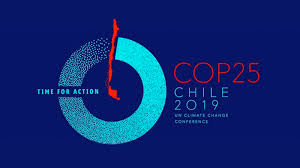
Affichage de l'article

04-07-2019 COP25 Chile 2019
As announced in December 2018, at the 24th United Nations Framework Convention on Climate Change, the next COP 25 will take place in Chile from 2 to 13 December 2019. Chile has great ambitions for COP 25 and wishes to focus on the following points:
– Oceans
Oceans capture and store more than 90% of the heat and about 25% of the carbon produced by emissions from human activities. With global warming, the oceans are also warming, making it more difficult to dissolve CO2 in the sea. If it is less absorbed by the ocean, CO2 will accumulate in the atmosphere, which will further accentuate global warming.
– Poles
Antarctica, the Arctic and mountain glaciers are important climate regulators because they reflect solar energy in space. Global warming causes a loss of ice mass which causes the rise of the oceans. As the ice surface decreases, the reflective power also decreases.
– The biodiversity
Species are vulnerable to climate change. The loss of biodiversity has an impact on the functioning of ecosystems and thus on the well-being of the Humanity. Chile has become aware of this problem and has created many terrestrial and marine protected areas.
– Forests
Forests play a fundamental role in mitigating climate change by capturing and sequestering CO2 emitted into the atmosphere. In addition, they preserve animal and plant biodiversity, water resources and protect the soil.
– Cities
Urbanization is becoming more and more important in the world. Cities consume energy for heating buildings, lighting, production units, transport ... These activities generate GHGs and global warming causes weather events that are difficult for residents to tolerate. Communities need to integrate climate risks into the city planning process and ensure optimized management of energy and water resources.
– Renewable energies
The development of renewable energies that do not generate direct emissions of greenhouse gases, instead of fossil fuels, is very important. Chile has rapidly converted to renewable energy without the need for direct subsidies. It is one of the most advanced countries in the development of clean energy.
– Circular economy
In 2016, Chile promulgated a framework law on waste management and recycling. In February 2019, its banned the commercial use of plastic bags.
– Electromobility
Mobility in cities is a major source of greenhouse gas emissions.. A study has been made for short journeys, focusing on non-motorized modes and promoting public transport. Santiago will expand its metro network and set up a fleet of electric buses.
